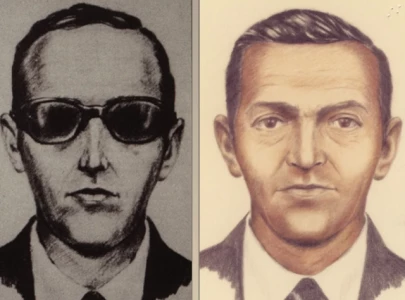It has taken decades of struggles, movements and political fights to get Pakistan on the rails. The people’s train, loaded with the energy of popular will, had a rough time moving forward on twisted rails, which was further blasted by constitutional landmines planted by martial leaders. Those who planned constitutional subversions and those who benefited from them justified this joke with one of the largest Muslim states, in the name of national interest. In all military takeovers and in subsequent interventions in the political process of the country from behind the scenes, there was always personal prejudice, partisanship and short-sighted, personalised understanding of the national interest.
We must salute Asghar Khan for holding his ground through these years and bringing before the courts, the nation and the world, the biggest national fraud ever committed in the form of rigging of the 1990 elections. This case, debated so much in the media during the past 16 years or so, should have occupied the apex Court earlier. We can celebrate it for what it says and consider it better late than never. The argument of national interest couldn’t be sold anymore to an independent judiciary unlike in the post-martial law packed courts. The history’s verdict is out, documented and on judicial paper. What is that? It is the rigging of elections, manipulating the political process, robbing financial institutions, twisting the roles of state institutions and bribing client politicians, who have served only in the special interests of individuals, and not that of Pakistan.
The story of ‘national interest’ and its embedded narratives in national security, ‘accountability’ and ‘true democracy’ had believers and takers in that particular constituency of the political class that tied up its political fortune with the military. This subordinate class of politicians formed parties, built up coalitions like the Islami Jamhoori Ittehad and secretively received funds to finance their campaigns. This class of politicians, using the instrument of power, has grown very strong pockets of strength in different parts to counter an organic growth of true representation of people.
What was the bargain between the client political class and the military? Simply put, it was the acquiring of power for serving the personal and group interests of the military leaders. Both enjoyed control over the state, economic resources and society. And while making money — tonnes of it — and allowing all friends and families to be in this political business, they were all defending, the Islamic Republic of Pakistan. What a joke.
Contradictions of these military leaders and those who supported them are quite obvious on two core issues: democracy and national security. Even a common rustic man on the street would know that a diverse society like Pakistan’s cannot make any progress on national integrity — which is the central point of security — without being ruled by representatives from different regions of the country. A selective co-optation of individuals by the military, in colonial fashion, only pushed the genuine representatives towards alienation, despondency and, in some cases, resistance. This remarkable judgment must help us bury the myth that military interventions and political manipulations serve national interest, security and the people. The actors in the plot did quite the contrary.
Published in The Express Tribune, October 23rd, 2012.
COMMENTS (15)
Comments are moderated and generally will be posted if they are on-topic and not abusive.
For more information, please see our Comments FAQ


1732538123-0/BeFunky-collage-(90)1732538123-0-165x106.webp)

1732536148-0/ariana-(1)1732536148-0-165x106.webp)







The judiciary of Pakistan especially their Supreme Court is perhaps displaying a support towards a democratic system where the judiciary enjoys an independent status similar to what one sees in India. How far this activity that is going on; that has been initiated by the Supreme Court of Pakistan; last and how effective shall the results be is yet to be seen? Off course the response of the Pakistan Army and Inter Services Intelligence will be yet another factor that will decide the ultimate fate of that nation and is their silence being read as a weakness or a simple compulsion on account of the problem of terrorism that the security forces in Pakistan are facing on the Afghan Pak border is a question that prudence and prudence alone can answer. Democracy in Pakistan should always be an idea even the people of that nation shall welcome however a weak and indecisive civilian government may not be what the people out there do really would want. Hence the fact remains as to how democracy develops in The Islamic Republic of Pakistan and how long it is able to function successfully? The question if answered would be arriving at any conclusion a bit too soon. The army as an institution in Pakistan has played a role that cannot be overlooked as this institution has ruled The Islamic Republic hence does have a substantial influence on any civilian government in the nation. The verdict of the Supreme Court of Pakistan although quite historic cannot be taken as the final judgement and a verdict that now democracy will stay put in Pakistan as there are still a number of slips between the lip and the cup. Democracy will need time to let the roots go deeper into the society.
@ Author: Historical oh really!... he has been CJ since last four years,, and never touched that case.... it surfaced again just few months back and so, quickly decided by our judiciary!!!!.... in favor of the Govt...Wow..!!!!!! ...He ditched Shareef's and PMLN because, his son, every one knows his son is facing criminal charges... he wil soon have to give another decision in the favor of his son...to acquit him from every charge....he is just making room for that decision before his own retirement. This is second time he stabbed in Nawaz shareef' Back.
Before that decision every one knew the the truth of IJI.. and PNA and now PTI again Hameed Gul and same lottas, created during IJI, now sailing in Imran's boat.... Hahhhh...
I'd argue, SC should have gone ahead and pronounced punishment for folks who violated constitution, broke law and misappropriated money.
But, that'll be another case now? The way we run cases in this sub-continents, all perpetrators will be dead before they are punished.
We need to learn from western democracies - The reason the folks fear law there is, people get punished and punished swiftly. Even if 10% of the folks get punished, there will be fear of punishment, thus better adherence to law.
Unfortunately, in subcontinent no one of substance ever goes to prison and serves a long harsh sentence.
The generals should be court martialed! How these generals have played with the destiny of this unfortunate country? Thet must be punished. CJ should have at least stopped their pensions & other perks.
Historical indeed! Retired General Hameed Gul is on record saying he formed IJI in opposition to PPP in 1990 elections and has the arrogance to openly challenge people to take him to court. Video clip of Hameed Gul interview is available on Youtube and can be provided by GEO TV if requested by the honorable courts. Since the courts have declared the 1990 election rigged, they should take suo motto notice of people like Hameed Gul and put him on the list of culprits. Than you Pakistan Supreme court and thank you Asghar Khan.
I wish to add something to this very well written and informative article, with which I am fully in agreement.
The good old saying, "An army officer must be a gentleman" is important. It is, at the same time, not possible to define precisely who is a gentleman. This is something that has to be understood in a rather oblique way. There are certain things that a gentleman will never do, and if someone does that ungentlemanly thing, he is not a gentleman, and thus should not be an army officer.
All armies have some officers who prove to be not gentlemanly. Those officers usually do not reach the high rank of Generals. Such officers are said to have low OLQ ( Officer Like Qualities). The OLQ of an officer is seen in his day-to-day personal and social life, besides his professional life.
In the past over sixty years Pakistani Generals have been doing many things they should have never done. The officers named by this SC judgement have done those things that a gentleman never does. In my considered view, the Pakistan army has been seen to contain too many officers who should never have become Generals, because of their low OLQ. Gen. Musharraf was a perfect example of an officer with very low OLQ, not that the other dictators were much better.
A large number of Generals of our army have done things that officers never do, but their misdeeds have yet to be exposed. This SC judgement is just the beginning, and should be applauded for that alone.
Unable to understand as to why when a judgement comes the 'fans' start beating drums "what a historical, what a remarkable judgement!". A judgement is a judgement and nothing more and it must be accepted, willy nilly, and acted upon. Judges are paid servants and to deliver the judgement is their duty. Petals of praise and commendations should be showered only if someone does something beyond his duty or freely out of love. Secondly, Asghar Khan is being loaded with tons of praise for his principled stand. I would like to ask him where were his principles when during the Tehreek of PNA he wrote a letter to General ZIA to topple the elected government of Bhutto. Thirdly, even if the elections of 90's were rigged it does not necessarily mean that a majority was converted into a minority. This is the same thing that though the elections under Bhutto were also rigged but even after keeping aside the controversial results Bhutto was a winner with a thumping majority.
Well argumented: National Interests" who knows the exact definition or purpose of the nationalinterests. The nation has paid a lot, cost has demaged this country just in the name oo security and national interests. Personal interest always remains first, both civilian and army have ruined this beautiful country. The lesson must be taught those had enjoyed public money and an open trial must be welcomed by the GREAT NATIONA OF PAKISTAN.
This has been shameful in our Pakistan
This is a very pragmatic and to the point Op Ed without much rhetoric at all. I salute Air Marshal Asghar Khan for his courage, fairness and persistence. May God bless him and give him a very long life. Even though Air Marshal has been a center right politician all his life and an opponent of PPP, he has been honest enough to go for justice, not for himself but for the people of Pakistan and the history. Like all mortals Air Marshal would one day pass away but he would always live in Pakistani history. These SC findings were known to most people for a long time but nobody did anything about that. In particular the rightwing politicians who benefitted from this stealing of elections were not looking for justice and truth. However, at his ripe age Air Marshal once again gave Pakistan his services without his own personal benefits. What is the benefit to Air Marshal for making PPP as victim and rightwing politicians and generals as the enemies of democracy and people? He would not and did not get anything except brought the truth out, which is almost impossible in Pakistan. Kudos to A. M. A. Khan!
@zanjabeel: And what about the corrupt army generals. They must stand trial.
The question of national security has been over-emphasized for convenience purposes. It was the raison d'être for successive military coups. So what action will be taken against culprits (Messers Baig and Duranni). Make an example. This nation has paid a very heavy price for the action of these Machiavellian and self-centered brass.
Next step: scrapping of the Army law, open trial of all living generals involved in unconstitutional and corrupt acts, accountability of military budget, slashing service perks that American and Chinese generals can only dream about, divestment of military from its vast economic empire ( a by-product of ruling the nation for 60 years), and a simple message from the People to their chowkidar: "take this gun and go stand at the border post, while we try to clean up the mess you created in the last half century".
The Army rules and will keep on ruling. Why? There is no bigger and powerful organisation than the Army. Whenever, if ever, people will see the sense in working to organise themsleves to become a party of the people, in control of the people, then there may be a chance things may start to change. But the qualities required for the people to organise themselves will come when people at large will try to change themselves. The change people need to bring into themselves is to get into the habit of becoming upholders of justice. To become upholder of justice is a painful matter but as we know no pain, no gain. If ever people change their habits for the good and become upholders of justice then the chances of people coming together to forge a union of the people will become greater. Until the people work to forge their unity to create a party of the people, in control of the people, the Army will remain dominant for all time to come.
All politicians who took the money should be life banned for future politics in the country.